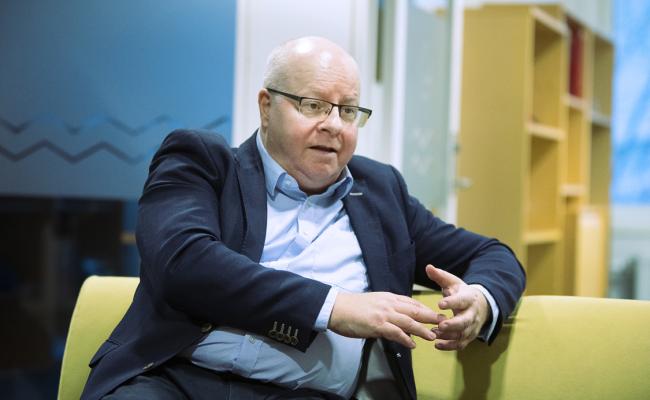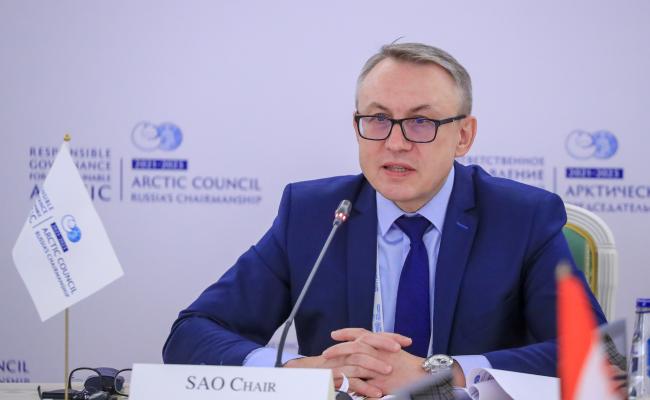Arctic Council: Security Issues Have Taken Over the Arctic Agenda, says Swedish and Danish Arctic Ambassadors
Louise Calais, Swedish Ambassador of Arctic Affairs and Senior Arctic Official for the Swedish Ministry of Foreign Affairs and Thomas Winkler, Denmarks Arctic Ambassador and Senior Arctic Official and Head of Department of Arctic and North America for the Danish Ministry of Foreign Affairs. Along with the Senior Arctic Officials of the Arctic seven, they took part in discussions during the Arctic Encounter confernce in Anchorage, Alaska in March. (Photo: Trine Jonassen)
Anchorage (High North News): The Danish and Swedish Arctic Ambassadors are fully behind the Norwegian agenda for the upcoming Arctic Council chairship and says it is time to get back to dealing with the climate crisis.
Tuesday Norway announced its agenda for the upcoming Norwegian chairship of the Arctic Council, divided into four main themes:
Sea, climate and environment, sustainable economic development, and people in the north.
Norway is set to assume leadership from Russia on May 11 and there is a great deal of anticipation attached to the transition from a locked out Russia.
Turn back
The Swedish and Danish Arctic Ambassadors and Senior Arctic Officials, Louise Calais and Thomas Winkler, are happy with Norways choice and tell High North News that it is time to turn the focus back on enviromental issues.
"These are topics we can agree on and which has been on the Arctic agenda for a long time, and which we fully support. For the Kingdom of Denmark, the focus on the sea and the environment is very important", says Thomas Winkler as HNN meets him and his Swedish colleague in Anchorage, Alaska, during the Arctic Encounter conference.
It is like it is no longer room for anything else
Calais nods in agreement.
"There is a lot we can work on in all areas and to continue to build on during the Swedish and Danish leadership as well", says Calais.
Taken over
The two ambassadors says the war has overshadowed the climate crisis in the Arctic.
"Military and security questions has taken over the Arctic agenda. It is like it is no longer room for anything else”, says Winkler about the security focus that has dominated the discussion since Russias invasion of Ukraine over a year ago.
“But we still have environmental issues, the “old” challenges are still there”, says Winkler, supported by his Swedish colleague.
"Before the war, there was a lot of focus on climate change and how it affects the Arctic and not least the challenges this entails for the indigenous people. This focus is almost gone and it is very unfortunate and problematic, says Calais and adds that the Arctic is the epicenter of the climate crisis.
"The effects of climate change are very noticeable here both on the environment and for the population."
Very concerned
“The focus has been on military threats, but we have to zoom out. We do not have a war or a race for recourses in the Arctic, what we are seeing is the relationship between Russia and the West being played out in the Arctic", says Louise Calais.
She says that the situation has had the Arctic Council very concerned, as the council found itself in a very good place before the war when Iceland transferred the chairship to Russia.
“But we are committed long term to preserve and protect the structures of the council, and we hope that Norway’s chairship will mean that we can resume more the work of the council."
Also read
Smooth transition
Norways focus areas is also something both countries are happy to continue working on, as they assume leadership - first Denmark, then Sweden - from Norway in two years.
Now Danish Arctic Ambassador Thomas Winkler has hopes for a smooth transition of the Council.
“The transition has been agreed upon between the eight states. We are trying to find ways to protect the council and Norway taking over is a step in the right direction”, says Winkler.
Indigenous Peoples
Among the most important reasons for the protection of the council, is the indigenous perspective. The Arctic Council has six Indigenous Peoples’ organizations as Permanent Participants in the Arctic Council, and has full consultation rights in connection with the councils deliberations and decisions.
Something that is unique on a global scale.
“That is also why we have to preserve the council”, says Winkler.
"Where do you stand on cooperation with Russia? Norwegian MFA Anniken Huitfeld says that it is important to find ways to cooperate?"
"We have a long-term commitment to the Arctic Councils structure and the council's survival,with eight members. But at the moment we see no possibility of cooperation with Russia because of their invasion of Ukraine", says Louise Calais.
We think this will go well.
"We have kept the door ajar because Russia is still a member of the council. Even if we cannot cooperate with them. So it is all on Russia. When Russia changes its behavior, the first place we will resume cooperation in is the Arctic, says Thomas Winkler.
Prepared
Are you hopeful about the transition?
"We think this will go well. The plan is being prepared and we are planning the takeover according to the circumstances. There will off course not be a ministerial declaration at the end of it", says the Swedish Arctic Official.
"It will not be business as usual. But there will be a transfer to Norwegian leadership, and that is what matters", says Danish Arctic Official Thomas Winkler.
No Arctic seven
But even if the Arctic seven works well toghether, it is clear that it is no Arctic Council without Russia as the country makes out almost half of the Arctic.
“A lot of our work in the Arctic has to do with Russia. If the council changes its structure, I think actors from outside the Arctic will step in. And that is not in the interest of the Arctic”, Douglas Jones, said during the debate about the the State of Arctic Geopolitics.
Jones is a Deputy Assistant Secretary for the Bureau of European & Eurasian Affairs at the US Department of State. He emphasizes that the council needs to remain at the forefront of Arctic cooperation.
“Putin can end the war today. Then we can talk about bringing them back”, Douglas Jones finished.




